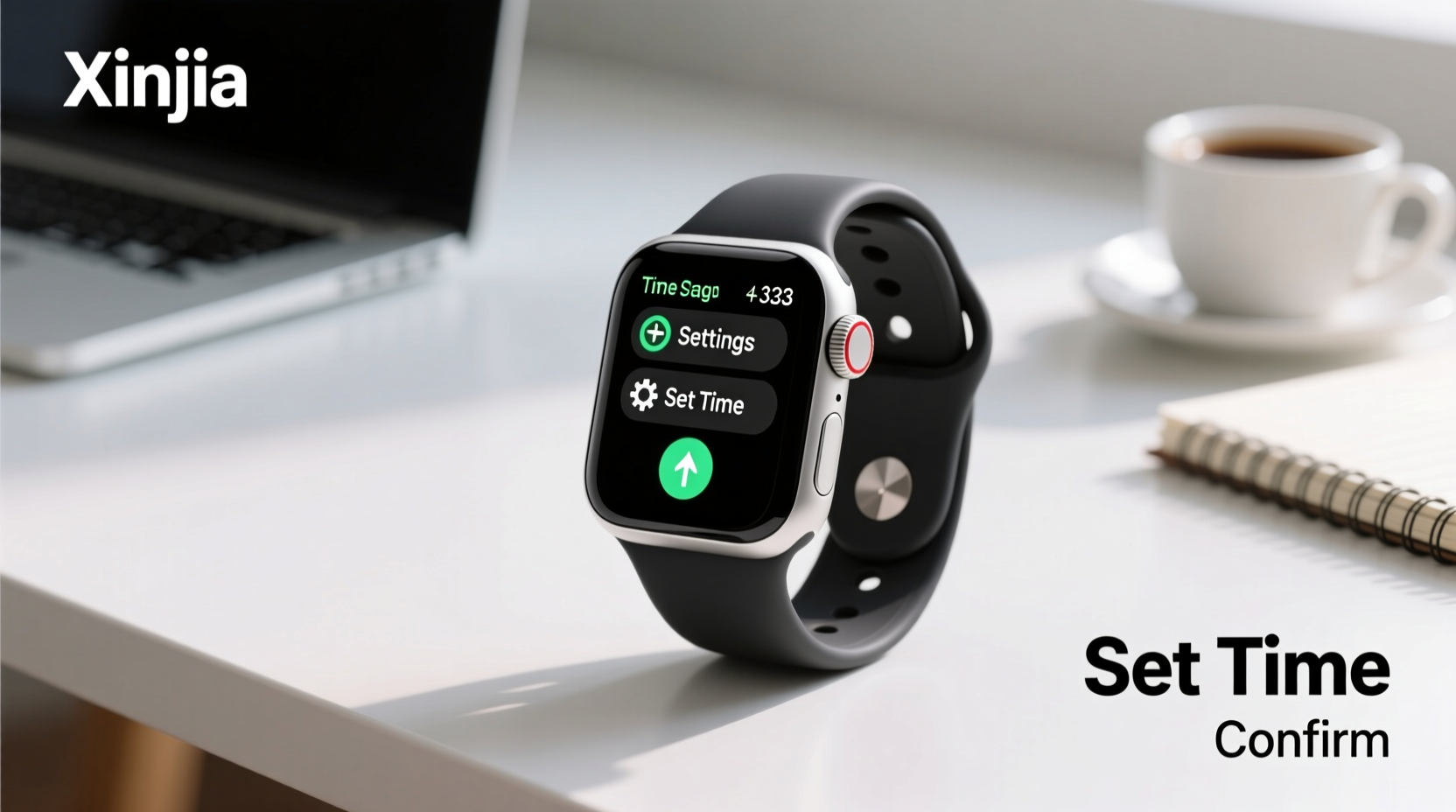Xinjia watches have earned a reputation for combining sleek design with reliable functionality at an affordable price point. Whether you’ve just unboxed your new timepiece or are resetting it after battery replacement, knowing how to adjust the time correctly is essential. While many assume it’s as simple as turning a crown, subtle variations between models can lead to confusion—or worse, incorrect settings that affect accuracy. This comprehensive guide walks you through every step clearly and safely, ensuring your Xinjia watch displays the correct time without damaging internal mechanisms.
Understanding Your Xinjia Watch Mechanism

Before adjusting the time, it’s important to understand the basic components of your Xinjia watch. Most models use a mechanical or quartz movement controlled by a stem (also called a crown) located on the right side of the watch face. The crown typically has two or three positions:
- Position 0: Normal position—used when the watch is running normally.
- Position 1: Pull out slightly—often used for setting the date (if applicable).
- Position 2: Fully pulled out—used for adjusting hours and minutes.
Some digital or hybrid Xinjia models may use button-based navigation instead. Always identify your model type before proceeding. Analog models dominate the lineup, so this guide focuses primarily on those, with notes for digital variants where relevant.
“Accuracy begins with proper setup. Even the most precise movement will mislead if set incorrectly.” — Daniel Reyes, Watch Calibration Technician
Step-by-Step Guide to Adjusting the Time
Follow these steps carefully to change the time on your analog Xinjia watch. Performing them in order reduces the risk of gear damage or misalignment.
- Remove the watch from your wrist. This prevents accidental pressure on the crown while turning, which could strain internal parts.
- Pull the crown gently to the second position. For most models, this means pulling it fully outward until you feel a soft click. If your watch has a screw-down crown, unscrew it counterclockwise first before pulling.
- Turn the crown clockwise to adjust the hands. Rotate slowly and observe the minute hand moving across the dial. Continue until the hour and minute match your desired time.
- Pay attention to AM vs. PM. Watches run on a 12-hour cycle. If it’s 3:00 PM, make sure the hands pass noon (12:00) during adjustment, not midnight.
- Push the crown back in securely. Once set, gently press the crown until it clicks into place. If it’s a screw-down type, rotate it clockwise to lock it.
- Check accuracy against a trusted time source. Compare your watch to a smartphone or atomic clock to confirm precision.
Digital and Hybrid Xinjia Models: Alternative Method
If your Xinjia watch features digital elements—such as an LCD display or dual analog-digital layout—the process differs slightly. These models usually rely on buttons rather than a traditional crown.
To set the time on a digital Xinjia watch:
- Press and hold the “Mode” or “Set” button (usually labeled ‘S’ or found at the 2 o’clock position) for 3–5 seconds until the digits begin to flash.
- Use the adjacent buttons (“Adjust,” “+,” or “Next”) to cycle through hours, minutes, and seconds.
- Navigate using short presses; hold to fast-forward.
- Confirm each setting by pressing the “Set” button again to move to the next field.
- Once complete, exit by holding “Set” or waiting 10 seconds for auto-save.
Refer to your user manual if available, as button labeling varies across batches. Many budget-friendly digital watches lack printed manuals, but model numbers (often engraved on the case back) can be searched online for specific instructions.
Common Mistakes and How to Avoid Them
Even experienced users occasionally make errors when resetting their watches. Here are frequent issues and how to prevent them:
| Mistake | Why It’s a Problem | How to Avoid |
|---|---|---|
| Setting time backward | Can damage gear train in some movements | Always move hands forward (clockwise) |
| Forcing the crown | May break stem or disconnect gears | Apply gentle, steady pressure only |
| Adjusting date near midnight | Stress on date wheel mechanism | Change date via time-setting outside 9 PM–3 AM |
| Leaving crown pulled out | Compromises water resistance | Always push in and screw down if applicable |
Mini Case Study: Recovering After Incorrect Adjustment
Sarah purchased a Xinjia NJ-202 analog watch online and attempted to set the time immediately after wearing it for a day. In haste, she pulled the crown and turned it counterclockwise multiple times, thinking it would speed up the process. The next morning, the date didn’t advance, and the minute hand stuttered intermittently.
She contacted customer support, who advised her to reset the time entirely by advancing the hands forward past 24 hours, allowing the date to cycle properly. After doing so, the watch resumed normal operation. The issue stemmed from reversing the movement under tension—a fixable error, but one that could have been avoided with proper technique.
Pro Tips for Long-Term Accuracy
Correctly setting the time is just the beginning. Maintaining consistent accuracy requires mindful habits. Consider these expert-backed recommendations:
- Wind mechanical models daily at the same time if not worn regularly.
- Avoid exposing the watch to strong magnetic fields (e.g., speakers, phones), which can disrupt movement.
- Clean the case and crystal monthly with a dry microfiber cloth to preserve legibility.
- Store in a cool, dry place away from direct sunlight to prevent material degradation.
Frequently Asked Questions
Can I set the date independently on my Xinjia watch?
Yes, on most analog models. Pull the crown to the first position (halfway out) and turn it clockwise. Each full rotation typically advances the date by one day. Do not adjust between 9 PM and 3 AM to avoid mechanical stress.
My watch isn’t keeping accurate time after setting—what should I do?
First, ensure the battery isn’t low (for quartz models). If the hands were reversed during setup, try resetting by advancing the time forward over a full 24-hour cycle. Persistent inaccuracies may require professional servicing.
Is my Xinjia watch water-resistant during time adjustment?
No. Never operate the crown or buttons while the watch is wet or submerged. Water resistance is suspended when controls are pulled or pressed. Always dry your hands and the watch before making adjustments.
Final Checklist Before You Finish
After setting the time, go through this quick verification process:
- ✅ Crown is fully pushed in (and screwed down if applicable).
- ✅ Time matches a reliable reference (phone, internet clock).
- ✅ Date displays correctly and changes at midnight.
- ✅ No unusual ticking sounds or hand stuttering.
- ✅ Watch is secure on your wrist and functioning normally.
Conclusion
Adjusting the time on your Xinjia watch doesn’t require technical expertise—just patience and attention to detail. By following the correct sequence, avoiding common pitfalls, and treating the mechanism with care, you’ll keep your timepiece accurate and reliable for years. Whether you're a new owner or refreshing your knowledge, mastering this fundamental skill enhances both function and enjoyment.









 浙公网安备
33010002000092号
浙公网安备
33010002000092号 浙B2-20120091-4
浙B2-20120091-4
Comments
No comments yet. Why don't you start the discussion?